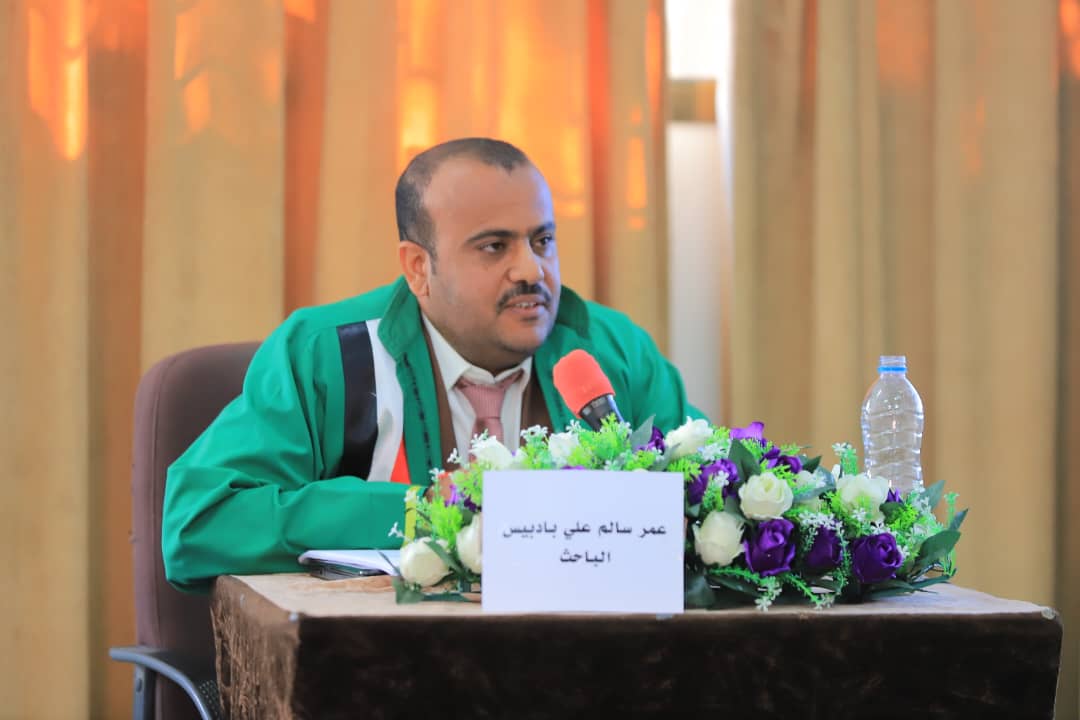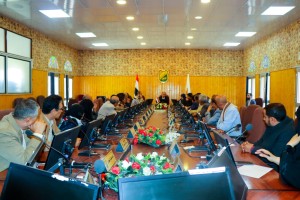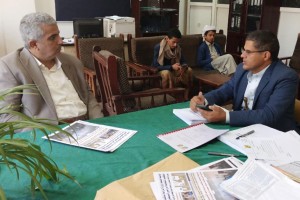Public PhD Viva-Voce Examination of Mr. Omar Salem Ali Badbis, from Department of English Language and Literature, Faculty of Arts & Humanities – Sana’a University
- Categories Letters and Promotions - Graduate Studies, news, Regulations - Postgraduate Studies
- Date December 23, 2024

Mr. Omar Salem Ali Badbis, a researcher in the Department of English Language and Literature at the Faculty of Arts and Humanities, has successfully awarded his PhD degree majoring in English Literature at Sana’a University. His dissertation, titled “The Portrayal of Arabs and Muslims in Selected Novels of Fadia Faqir: A Self-Orientalist Approach,” was defended on Saturday, 20 Jumada 11, 1446 Hijri, corresponding to December 21, 2024.
The Viva-Voce Committee, which was formed based on a resolution issued by the Post-Graduate Studies and Scientific Research Council, consisted of the following:
1. Prof. Yahya Hassan Al-Wazzaf, External Examiner, Amran University, Chair.
2. Prof. Rawya Ali Al-Kamim, Main Supervisor, Sana’a University, Member.
3. Prof. Mohammad Ahmed Sharafuddin, Internal Examiner, Sana’a University, Member.
The primary objective of the dissertation was to investigate the Orientalist methodologies employed by Anglophone Arab novelists, particularly Fadia Faqir, in their representations of Arabs and Muslims concerning individual identities, societal constructs, and cultural narratives. The dissertation findings indicated that Fadia Faqir perpetuates Orientalist stereotypes within her literary works, depicting male characters as cruel, lustful, and hypocritical, while female characters are portrayed as passive, submissive, and marginalized in comparison to their idealized Western counterparts. Furthermore, the novels emphasize the perceived corrupt and irredeemable nature of Arab and Islamic societies, spotlighting issues such as male dominance, misogyny, slander, moral decay, and honor killings.
Additionally, Faqir’s use of a binary analogy approach contributes to the Westernization of Arab and Islamic cultures by selectively highlighting certain customs and practices while framing Islam as a primary source of extremism and fanaticism. In contrast, Western culture is depicted in an idealized manner, showcasing its customs as fundamentally distinct from the “primitive” practices attributed to Arabs and Muslims, thereby reinforcing the notion that modernity is an exclusive characteristic of the West.
In his dissertation, Badbis offered several recommendations aimed at guiding Arab novelists writing in English towards more accurate and nuanced representations of Arabs and Muslims. These recommendations include the necessity for novelists to present a diverse array of Arab and Muslim characters that reflect various social, economic, and cultural backgrounds. He emphasized the importance of avoiding reductive portrayals that serve to fulfill exotic fantasies; instead, authors should strive to create complex, multi-dimensional characters with varied ambitions, challenges, and successes that transcend simplistic narratives. Furthermore, he advocated for a comprehensive depiction of the intricate tapestry of cultural traditions and religious customs, calling for a balanced narrative approach that acknowledges both the positive and negative aspects of these cultures.
The Viva-Voce was attended by several academics, researchers, students, and several colleagues and family members of the researcher.
Discover more from Sana'a University
Subscribe to get the latest posts sent to your email.
Previous post






